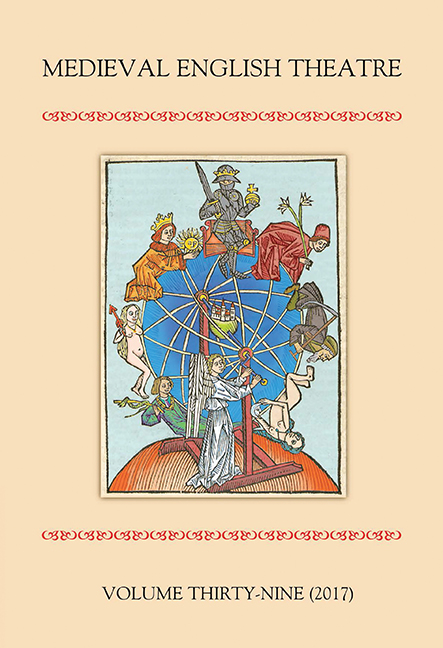Book contents
- Frontmatter
- Contents
- List of Illustrations
- Editorial
- Online Links
- Pageant-Carriage Maintenance at Chester
- Carnevale in Norwich, 1443: Gladman's Parade and its Continental Connections
- The Beccles Game Place and Local Drama in Early North-East Suffolk
- Pendens super feretrum: Fergus, Aelred, and the York ‘Funeral of the Virgin’
- George Gascoigne at Oxford
- Elizabeth Nevile's Wedding Entertainments: A Yorkshire Family Celebration in 1526 and its Contexts
- Herod's Killing of the Children in New College Chapel Oxford, 8 February 2017 (review)
- Editorial Board and Submissions
Editorial
Published online by Cambridge University Press: 17 July 2019
- Frontmatter
- Contents
- List of Illustrations
- Editorial
- Online Links
- Pageant-Carriage Maintenance at Chester
- Carnevale in Norwich, 1443: Gladman's Parade and its Continental Connections
- The Beccles Game Place and Local Drama in Early North-East Suffolk
- Pendens super feretrum: Fergus, Aelred, and the York ‘Funeral of the Virgin’
- George Gascoigne at Oxford
- Elizabeth Nevile's Wedding Entertainments: A Yorkshire Family Celebration in 1526 and its Contexts
- Herod's Killing of the Children in New College Chapel Oxford, 8 February 2017 (review)
- Editorial Board and Submissions
Summary
This volume testifies to the vitality of the field of early theatre, demonstrating the eclectic range of interests METh engages. A group of essays approach the performance records of civic and community drama. Philip Butterworth takes us back to the founding principles of METh by exploring the technology of pageant-waggon maintenance and manoeuvre in the light of the Chester records – the pageant waggon being the subject of the very first volume of the journal in 1979. Similarly seeking to make sense of fragmentary record evidence, James Stokes investigates the scattered and enigmatic references to ‘camping closes’ and ‘game places’ as potential performance sites in the vicinity of Beccles in Suffolk. Jamie Beckett starts from a puzzling textual reference, the name of the Jew ‘Fergus’ in the lost York Funeral of the Virgin, pursuing local history and tradition to identify a possible hate figure. The perspective is broadened by Tom Pettitt's wide-ranging and suggestive discussion of Gladman's supposed ‘Carnival’ parade in Norwich in 1443, and the revealing analogues of street performance that may be found not in England but in Italy. James McBain pursues not different locations but different types of audience: examining Gascoigne's skilful play on New Comedy in the Supposes, he evaluates how different levels of familiarity with the genre in audiences at the Inns of Court and the University of Oxford suggest different kinds of spectator response. These last three essays all arise from papers given at the 2016 METh meeting at Canterbury, while Diana Wyatt's was delivered at the 2017 event at Glasgow. Based on a family record of a 1526 wedding, this opens up the field of household drama, with the apparently traditional mounting of a ‘maske and play’ as part of the celebrations. Apart from these essays, we are pleased to engage with theatrical productions of the last year, with Peter Happé's review of Elisabeth Dutton's production of the Digby MS The Killing of the Children, mounted on 8 February 2017 in the chapel of New College, Oxford.
The 2017 METh meeting, held in Glasgow with co-hosts Pamela King and Eila Williamson, was a special event, held to honour the life-work of Philip Butterworth, a founder member of METh.
- Type
- Chapter
- Information
- Medieval English TheatreVolume Thirty-Nine (2017), pp. 1 - 3Publisher: Boydell & BrewerPrint publication year: 2018



